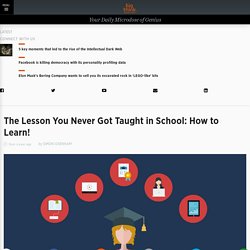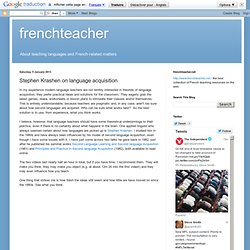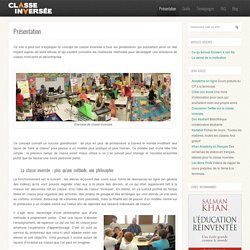

Didactique de l'écrit, de la littérature en FLE. The lesson you never got taught in school: How to learn! A paper published in Psychological Science in the Public Interest evaluated ten techniques for improving learning, ranging from mnemonics to highlighting and came to some surprising conclusions.

The report is quite a heavy document so I’ve summarised the techniques below based on the conclusions of the report regarding effectiveness of each technique. Be aware that everyone thinks they have their own style of learning (they don't, according to the latest research), and the evidence suggests that just because a technique works or does not work for other people does not necessarily mean it will or won’t work well for you. If you want to know how to revise or learn most effectively you will still want to experiment on yourself a little with each technique before writing any of them off. Elaborative Interrogation (Rating = moderate) A method involving creating explanations for why stated facts are true.
An example of elaborative interrogation for the above paragraph could be: Reference: Enseigner à apprendre- Techniques d'apprentissage du FLE. Comment rendre notre enseignement plus efficace ?

Comment guider nos élèves dans leur apprentissage ? Comment enseigner à apprendre ? Quelles techniques doit-on leur enseigner afin qu’ils sachent construire leur savoir… ? Telles sont les questions que je me pose en ce moment. En effet, dans les conseils de classe, il ressort souvent que nos élèves ne savent pas s’organiser, qu’ils ne savent pas comment étudier, comment apprendre… Mais je pense que le rôle de l’enseignant est aussi de leur enseigner à être autonomes dans leur apprentissage en leur communiquant quelques techniques.
La notion de stratégie d’apprentissage Il s’agit d’une fiche pédagogique réalisée par Paola Bertochini et Edvige Costanzo pour le Français dans le Monde destinée aux futurs enseignants de FLE. Flipped Class Helpful Documents. After the #flipchat at the beginning of July, I wanted to have a single place where I could add documents that I talk about in my blog.

Hopefully this will make it easier for everyone to find what they are looking for. I am putting all of the docs on through Google Docs. Please feel free to use them and modify them for your own uses. Parent/Student Flipped Class Intro Letter - I sent this letter to all my parents and students prior to the first day of class last year so that they would have an idea of what the new class structure would be. This coming year I am going to also send a link to a Google Doc to try to find out about technology issues prior to the beginning of the school year. Flipped Parent Video - This video is new for this year. Class Outline (given to students on 1st day) - This is what I used last year. Unit Assignment Sheet - Here is a copy of a unit assignment sheet. New Unit Assignment Sheet - I have updated this to be easier to read for the students.
Parent Flip Video. Stephen Krashen on language acquisition. In my experience modern language teachers are not terribly interested in theories of language acquisition; they prefer practical ideas and solutions for the classroom.

They eagerly grab the latest games, realia, worksheets or lesson plans to stimulate their classes and/or themselves. This is entirely understandable, because teachers are pragmatic and, in any case, aren't too sure about how second languages are acquired. Who can be sure what works best? So the best solution is to use, from experience, what you think works. I believe, however, that language teachers should have some theoretical underpinnings to their practice, even if there is no certainty about what happens in the brain. The two videos last nearly half an hour in total, but if you have time, I recommend them. One thing that strikes me is how fresh the ideas still seem and how little we have moved on since the 1980s. Playing to Learn? by Maria Andersen on Prezi. Classe Inversée. Ce site a pour but d’expliquer le concept de classe inversée à tous les professeurs qui souhaitent avoir un réel impact auprès de leurs élèves et qui veulent connaitre les meilleures méthodes pour développer une ambiance de classe motivante et décontractée.

Exemple de classe inversée Ce concept connait un succès grandissant : de plus en plus de professeurs à travers le monde modifient leur façon de “faire la classe” pour passer à un modèle plus pratique et plus humain. Ce modèle part d’une idée très simple : le précieux temps de classe serait mieux utilisé si on s’en servait pour interagir et travailler ensemble plutôt que de laisser une seule personne parler. La classe inversée : plus qu’une méthode, une philosophie Professeur guidant un groupe de travail Il s’agit donc davantage d’une philosophie que d’une méthode à proprement parler.
Un modèle plus humain Les interactions deviennent plus conviviales Les avantages de ce modèle sont multiples, mais le principal est la liberté qu’il procure. Tâches et Projets Pédagogiques en classe de FLE. SITE DE DIDACTIQUE LANGUES ET CULTURE. Apprendre à apprendre. Apprendre à Apprendre.